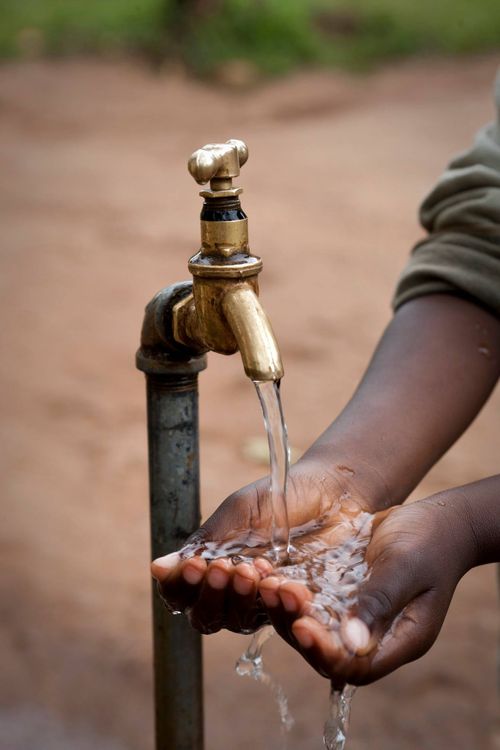By Angela Mtambo & Charles Mafa
The US$53 million government-initiated water project, launched in 2017 to improve water supply in several towns within the northern regions, including Muchinga, Luapula and Western Provinces, has apparently led to more occurrences of dry taps in Kasama town, as voiced by local residents.
To compound the issue, the project, financed by a loan from the African Development Bank (ADB), was awarded to China State Construction, a firm known for its successful history in housing construction, infrastructure and investment, real estate investment and development, and investigative design.
However, they had no prior experience in the water sector. This decision seems to have been the project’s initial stumbling block.
Adding to the complexity of the problem, and in keeping with the pattern observed in previous projects initiated by the Patriotic Front (PF) party in government, 20 percent of this project was sub-contracted to local companies owned by individuals affiliated with the ruling party.
The pipes and meters have been installed, and the project will be subsequently transferred to Chambeshi Water Supply and Sanitation Company by the end of this October. However, it has been discovered that, in their haste to meet the project’s deadline, the company had connected pipes and meters to plots without any occupants.
Disappointments
Many residents had high hopes that the incoming government would swiftly tackle the issues plaguing the project. However, to their dismay, the ‘new dawn’ government has yet to take any action.
Based on our ongoing investigations, it was expected that China State Construction would connect about 16,000 houses to the water pipes in three districts – Kasama, Mbala and Mpika. However, the actual number of houses connected falls significantly short of this target, with not even half of the intended homes having been linked to water supply, according to those familiar with the project.
The project consultant is a company called GOPA, responsible for providing supervisory services to ensure that the project adheres to the agreed plan.
MakanDay posed some questions to the consultant, including questions about the total number of properties connected under the new project.
Rocky Kasanga, the lead consultant, clarified that, in Kasama, a total of 6,000 customers have already been connected, and the remaining 2,000 will also be connected by the end of October, bringing the number to 8,000.
Kasanga is optimistic that the additional 10,000 cubic litres of water integrated into the network have effectively resolved the water supply issues.
He emphasised, “Currently, there are no persisting challenges. The introduction of additional water into the network effectively resolved the problems. Although challenges may have been present before the project commenced, they have all been successfully addressed.”
He further mentioned that the contractor will remain committed to addressing any remaining issues until October 31, 2023. However, once the project is transferred to Chambashi Water, any ongoing issues will become their responsibility.
The ADB-funded project
The project was to setup new water supply points, lay new pipes, rehabilitate the old water supply system, install meters and start supplying water to some of the un-serviced areas.
According to the project brief on the ADB official website, the project’s aim was to improve water supply infrastructure, including the construction of new water treatment plants, transmission systems, water distribution networks, and the rehabilitation of existing water supply and sanitation infrastructure, including the installation of water meters.
The project’s original goal was to enhance both the quantity and quality of water supply, with the objective of reducing the prevalence of waterborne diseases, including but not limited to cholera, diarrhea, and trachoma.
Cry from Kasama residents
However, in Kasama, it appears that the opposite is taking place, as residents are encountering heightened issues with the reliability of their water supply.
Melody Bwalya, a 30-year-old married mother of three, shared with MakanDay the persistent water supply issues faced by residents in Chiba Compound, her place of residence.
She recounted a brief period of optimism when a water supply project was concluded, providing consistent and clean water flow around the clock for three months. However, their hopes were soon dashed when they were charged K950 for water connection.
Despite many residents, including Bwalya, paying the fee, the water delivery system became unreliable, with water accessible only three times a week, often at inconvenient hours.
Bwalya, like numerous others in Chiba, resorted to investing in water storage containers just to meet their basic water needs.
She lamented, “Considering our living standards, most of us cannot afford such a luxury.”
This issue isn’t isolated to Chiba; residents in areas like Mulenga, Airport, and Location face similar water supply challenges.
According to our survey, several meetings have been held between the company and the local residents, but a lasting solution remains elusive.
These meetings took place at various locations, including Namulundu, Mulenga village, Chiba, Chisanga, and Airport Compound. Both company officials and residents were present at these meetings.
One of the prominent topics of discussion revolved around the issue of inconsistent water supply.
For instance, in Airport area, water was flowing in some properties while others received no water supply, even though the valves had been opened.
Furthermore, the situation is exacerbated by leakages in the new connections, the absence of meter readers, and a lack of water availability in many areas.
Despite the company starting the installation of post-paid meters in June, customers have yet to receive water bills, as reported by some residents.
While meters have been successfully installed on all properties with water connections, no readings have been recorded due to the unavailability of meter readers. Newly hired meter readers are currently undergoing orientation.
Chambeshi Water Supply and Sewerage Company
The company itself appears to be grappling with its own set of challenges, which include employing unqualified staff resulting in unaddressed complaints and subpar customer service.
Additionally, the company is burdened by financial woes, with outstanding debts of K6.7 million owed to the National Pension Scheme Authority (Napsa), delays in contributions to the National Health Insurance Policy (Nhima), and outstanding salary arrears for management personnel extending to two months. Notably, payments have been made only to unionised workers.
Company and government’s response
Lackson Simumba, the Managing Director of Chambishi Water, has confirmed that the company indeed has outstanding debts to Napsa. However, he attributed the substantial debt owed to Napsa primarily to the accumulated penalties levied on the original principal amount.
“In fact, if you examine the numbers closely, you’ll find that the penalties exceed the actual principal debt. While the principal amount owed to Napsa stands at K 6.7 million, the penalties have escalated to over K10 million,” he explained.
In reference to the non-remittances to Nhima, Simumba clarified that this issue stemmed from delays in the registration of employees into the national health scheme.
Simumba expressed his confidence that the debt and salary arrears will be fully resolved shortly. He mentioned that the company has already taken steps to clear the Napsa principal debt, leaving only the outstanding penalties.
“We are making substantial progress in our payments and are now in the process of remitting the funds to Napsa. Our aim is to prevent the accumulation of the K6.7 million in the near future,” he affirmed.
“In terms of salary arrears, we have resolved with the unions, we have reduced management’s salary arrears from four months to two months,” he added.
Simumba was also requested to provide an explanation regarding allegations of compromising the company’s reputation through the employment of underqualified and unqualified personnel.
He said in 2021, the government, enlisted the services of a consultant to conduct an evaluation of both qualifications and organisational structures. From the findings in the assessment report, specific positions were reclassified as unqualified due to the structural upgrades.
“We discovered that most of the customer service assistants, who initially were supposed to be just having a grade twelve, to just read meters for example, the report recommended that…they should at least have something to do with business course,” he explained.
Joe Kalusa, Permanent Secretary at the Ministry of Water Development and Sanitation, acknowledged that the government is aware of the financial difficulties confronting the water company. He said that the government has extended a financial aid package to address a two-month salary arrears.
“We’ve also taken measures to help resolve outstanding obligations with Zesco. Furthermore, we’ve facilitated the disbursement of payments to retirees still listed on the company’s payroll,” he elaborated. “As a ministry we’re … giving that company hundred percent support.”
The Board and Allegations of Interference
Moreover, the board is alleged to be actively involved in the day-to-day operations of the company, with claims of influencing decisions primarily aimed at enhancing the political standing of the chairperson, Wadden Chileshe.
Chileshe, a prominent member of the ruling United Party for National Development (UPND), in Northern Province, is rumoured to have aspirations of running for a Member of Parliament position in Mporokoso Constituency.
MakanDay contacted Chileshe for a statement concerning these allegations, and he confirmed his intentions.
As the company grapples with resolving these challenges, residents of Kasama, including Bwalya, are eager for a solution to the erratic water supply.
Angela is a talented Kasama-based journalist. She recently secured an internship placement at MakanDay as the runup in the prestigious inaugural 2022 MakanDay media awards.
Photo credit: Zambia Daily Mail

Discover more from MAKANDAY
Subscribe to get the latest posts sent to your email.



